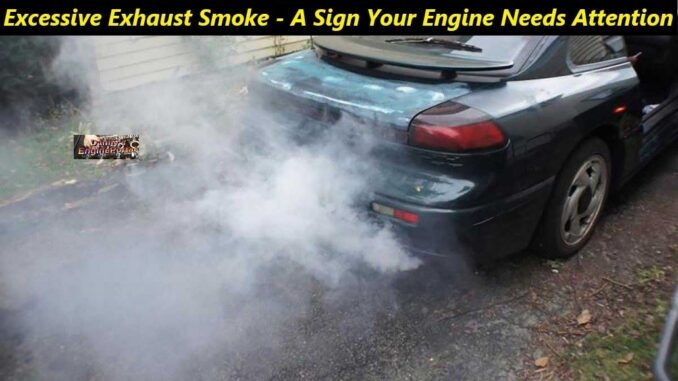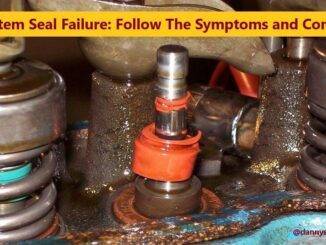
EXCESSIVE EXHAUST SMOKE, MAY BE THE FIRST SIGN THAT YOUR ENGINE NEEDS ATTENTION.
As the engine burns fuel and creates exhaust, lots of different things are happening.
So, if your engine is operating in tip-top shape, tailpipe smoke should be nearly undetectable.
But, if excessive exhaust smoke is visible, you likely have a real problem.
Consequently, many underlying engine problems can be solved by, making an exhaust smoke color diagnosis. So, the important thing, is to pay attention to your car’s operation, and notice if anything seems off.
Because, excessive exhaust smoke means, you have an engine issue on your hands.
Take note of when the smoke appears and what color it is. Avoiding the problem will only shorten the life of the engine, and result in unnecessary repair bills.
LETS CONSIDER SOME OF THE SYMPTOMS, THAT WILL HELP US TELL HOW BAD THINGS ARE:
- Does the engine seem to be, a bit lower in power than it used to be?
- Is the engine running, a bit hotter than it used to?
- Is the engine making, more noise than it used to under load?
- Does the engine fume, when you open the oil filler cap?
A smoky engine is telling you something. When the engine starts to smoke there’s something not quite right, and this needs further investigation. So, the color of the smoke, will be a good indicator, of what may be going on.
The first thing that must be done is, to determine the color of smoke.
THE FOUR MOST COMMON COLORS, OF EXCESSIVE EXHAUST SMOKE ARE:
- Blue
- Grey
- White
- Black
The Causes Of, Blue Smoke From Exhaust
There are many possible sources, of blue smoke from exhaust:
- Worn valves or valve guide seals
- Turbocharger issues
- Failure to change your oil or oil filter regularly
- Damage or wear to piston rings
When your engine emits blue smoke from the exhaust, this is usually a sign that your engine is burning oil. In most cases, oil is leaking, somewhere within the combustion chamber.
Also, the valve seals or piston rings, may have become worn and need to be replaced. On turbocharged engines, blue engine smoke can sometimes indicate, the turbo needs attention.
The Causes Of, Grey Smoke From Exhaust
Slightly more difficult to diagnose, grey engine smoke, can have a number of meanings. In some cases, this can also be the sign of, the engine burning oil or having a faulty turbocharger. As a result, this excessive exhaust smoke, is bad.
Furthermore, there could be an issue with transmission fluid burning. Also, there may be a problem with the transmission vacuum modulator. Sometimes, a (PCV) valve, has stuck and needs attention.
The Causes Of, White Smoke From Exhaust
Thin, wispy vapors or white smoke, can sometimes be, a build-up of condensation in the exhaust system. But, in the most serious cases, the engine might be burning coolant. As a result, this excessive exhaust smoke, is bad.
Consequently, caused by a cracked engine block, a blown head gasket, or some type of damage to the cylinder head. Overfilling the engine with oil, can also cause white smoke, to pour out of the tailpipe. Learn how to fill your engine with the correct amount of oil to avoid this. As a result, this excessive exhaust smoke, is bad.
The Causes Of, Black Smoke From Exhaust
Black smoke from the exhaust could be caused by, something as simple as, a clogged air filter. Similarly, this might indicate, faulty fuel injectors, sensors, or some type of issue with, the fuel pressure regulator.
Black smoke, is usually a sign that your engine is burning, an excessive amount of fuel. This is bad for your car’s health, economy, as well as any people! Similar to cigarette smoke, black smoke can cause all kinds of problems for us, if breathed in.
CONCLUSION
So, there are many reasons, you may see excessive exhaust smoke, coming from your exhaust. Ultimately, exhaust smoke color diagnosis may not tell you the exact problem. But, it can give you a much better idea, of what you’re dealing with. And, whether you could attempt to fix it yourself.
BY DANNY BENDER




